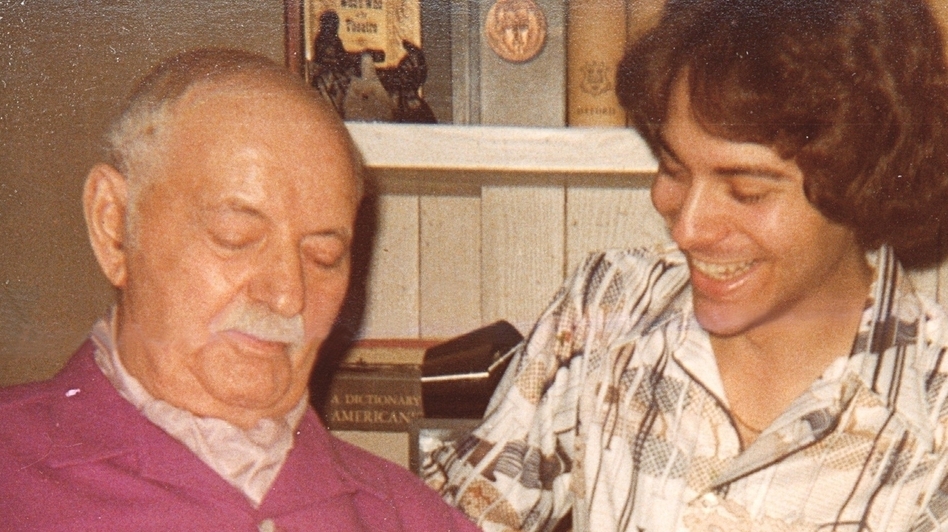Publishing Talks: David Wilk interviews Eugene Schwartz
June 9, 2013 by David
Filed under Ebooks and Digital Publishing, Publishing History, PublishingTalks, Technology, The Future
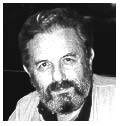 In this series of interviews, called Publishing Talks, I have been talking to book industry professionals and other smart people about the future of publishing, books, and culture. This is a period of disruption and change for all media businesses. We must wonder now, how will publishing evolve as our culture is affected by technology, climate change, population density, and the ebb and flow of civilization and economics?
In this series of interviews, called Publishing Talks, I have been talking to book industry professionals and other smart people about the future of publishing, books, and culture. This is a period of disruption and change for all media businesses. We must wonder now, how will publishing evolve as our culture is affected by technology, climate change, population density, and the ebb and flow of civilization and economics?
I hope these Publishing Talks conversations can help us understand the outlines of what is happening in the publishing industry, and how we might ourselves interact with and influence the future of publishing as it unfolds.
These interviews give people in and around the book business a chance to talk openly about ideas and concerns that are often only talked about “around the water cooler,” at industry conventions and events, and in emails between friends and they give people inside and outside the book industry a chance to hear first hand some of the most interesting and challenging thoughts, ideas and concepts being discussed by people in the book business.
Gene Schwartz has been an active participant in the publishing business for many years. I first knew him as the ubiquitous representative of the magazine Foreword, covering every possible book and technology event for the benefit of independent publishers. He still works as editor at large of Foreword Reviews. He is an industry observer, an occasional blogger and columnist for Book Business magazine, a member of its editorial advisory board and its Publishing Business Conference and Expo Advisory Board. He heads his own publishing consultancy, Consortium House, and is currently engaged in new business development projects for Waterside Productions, He is also notably co-founder of Worthy Shorts Inc., an innovative online private press and publication service for professionals , publishers and associations
In an earlier career, he was in the printing business, directed production at Random House and CRM Books/Psychology Today and was director of production and operations for Prentice-Hall/Goodyear. He is a former PMA (IBPA) board member and founder of the San Diego Publishers Group.
Schwartz has a civil engineering degree from CCNY and completed graduate course work in public administration at NYU, so like many of us in the publishing business, he came to this business from a very different background.
I thought it would be valuable to talk to Gene about publishing, past, present, and future, since he has been involved in so many different aspects of the business over such a long period of time. He is consistently perceptive about the way technology and change can be harnessed by publishers and others in the book business, and has a terrifically tuned critical sensibility that he can bring to bear on any subject. We had a great talk and covered a wide range of subjects in this interview.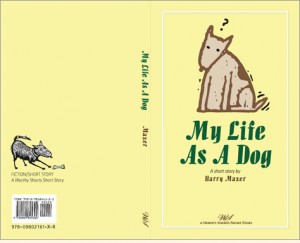
Podcast: Play in new window | Download
Staughton Lynd: Accompanying: Pathways to Social Change
May 20, 2013 by David
Filed under Non-Fiction
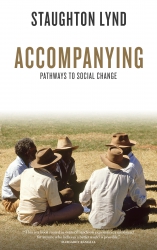 978-1-60486-666-7 – PM Press – Paperback – $14.95 (ebook versions available at lower prices)
978-1-60486-666-7 – PM Press – Paperback – $14.95 (ebook versions available at lower prices)
For me and for many others who came of age politically in the mid-to-late sixties, Staughton Lynd was an early and important figure. He had been a Quaker and war resister, Civil Rights Movement participant, was cogent and critical about social structures and an early leader in the anti-Vietnam War movement. He taught at Yale, but left academia, earned a law degree, and with his similarly activist partner and wife Alice Lynd, moved to Youngstown, Ohio and became active in the effort to save the steel mills there. While that effort did not succeed, the Lynds have remained in Ohio for over 30 years working at a grass roots level in the labor movement, as well as with imates of Ohio prisons and with others across the country.
Accompanying is a short book, but extremely focused and coherent. Lynd contrasts the hierarchical “organizing” efforts of the sixties civil rights and antiwar movements with the concept of “accompaniment” first articulated by Archbishop Oscar Romero of El Salvador, wherein organizers listen to their colleagues rather than instructing them. Lynd then applies this distinction between organizing and accompaniment to the social movements in which he has been a participant for the past fifty years, which include the labor movement, civil rights, antiwar organizing, prisoner insurgencies, and the Occupy movement of the past few years. Alice Lynd, who has been his partner in all these efforts, adds her experience as a draft counselor during the Vietnam War era and now as an advocate for prisoners in maximum-security facilities.
The Lynds together bring an incredible range of experience, dedication and commitment to the human spirit and to the kind of social change that so many have wished for and demanded for so long. I was struck by how their description of accompaniment resonates so well with the principles of cooperation and listening espoused by so many who have grown up in the Internet era. It’s crucial to connect these ideas to political and economic analysis and to questioning the organizing principles of our society. Anyone interested in social change in the modern world should read this book and attend to its simple and powerful precepts. Here’s a great piece by Lynd speaking at the IWW Centenary in 2005, a website with more information about his work, and the publisher page for Lynd and his books (recommend buying directly from the publisher, PM Press, to support its work). 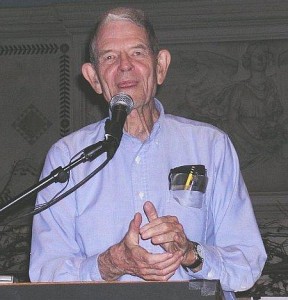 I am honored to have been able to have this conversation with this ever intelligent, dedicated, and coherent activist and writer.
I am honored to have been able to have this conversation with this ever intelligent, dedicated, and coherent activist and writer.
Podcast: Play in new window | Download
Publishing Talks: David Wilk interviews Thomas Schinabeck
May 5, 2013 by David
Filed under Ebooks and Digital Publishing, PublishingTalks, Technology, The Future
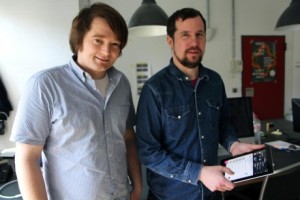 In this series of interviews, called Publishing Talks, I have been talking to book industry professionals and other smart people about the future of publishing, books, and culture. This is a period of disruption and change for all media businesses. We must wonder now, how will publishing evolve as our culture is affected by technology, climate change, population density, and the ebb and flow of civilization and economics?
In this series of interviews, called Publishing Talks, I have been talking to book industry professionals and other smart people about the future of publishing, books, and culture. This is a period of disruption and change for all media businesses. We must wonder now, how will publishing evolve as our culture is affected by technology, climate change, population density, and the ebb and flow of civilization and economics?
I hope these Publishing Talks conversations can help us understand the outlines of what is happening in the publishing industry, and how we might ourselves interact with and influence the future of publishing as it unfolds.
These interviews give people in and around the book business a chance to talk openly about ideas and concerns that are often only talked about “around the water cooler,” at industry conventions and events, and in emails between friends and they give people inside and outside the book industry a chance to hear first hand some of the most interesting and challenging thoughts, ideas and concepts being discussed by people in the book business. They also provide an opportunity to hear what all kinds of leaders and participants in publishing have to say about the communication between writers and readers through the particular lenses of their own experiences.
We’re far enough along in the development of ebooks and digital reading for numbers of individuals and companies to be interested in developing new ways to package and present text in ways that differ from those that developed over the last few hundred years of analog “real world” print publishing. Applications like Flipboard, Instapaper, Pocket, and Readability all allow readers to curate their own reading experiences by “clipping” articles and stories on the web, and saving them into reading software that makes both a better reading experience on your tablet than websites on laptops or desktops allow, and enables reading at leisure in a self controlled context. And sites like Social Reader from the Washington Post enables sharing and finding web content through existing social networks.
Dotdotdot, a new application now in beta, developed by Thomas Schinabeck and friends in Berlin is similar in shape, but goes farther, I think, to enable readers to have much finer controls over their e-reading experiences. Dotdotdot allows me to upload my own epubs as well as content I have discovered on the web, or that friends may have sent me. The site is socially enabled, so that members of the community can choose to share their own and follow what other users are reading. Annotation also adds to the reading and sharing experience – marginalia is fully integrated into the dotdotdot experience, so it is a truly social reading platform. And its archive capability allows readers to use dotdotdot as a repository – independent of devices or the closed ecosystems that e-readers create. And dotdotdot, unlike all the other content aggregating programs I have seen, is designed around long form reading.
“We thought if we find a technical solution for how we can import texts into a platform that the user already has, we can provide all the stuff on top of it that makes a great user experience, and also uses the full potential of digital text,” Schinabeck said in an article about dotdotdot on Pando Daily in January 2013 (now a bit out of date, but still a great description of the site).
Thomas and I had a terrific conversation in March 2013 both about the program he and his partners have created, as well as exploring some of the philosophical and technological underpinnings that drove the establishment and development of what I think is a really compelling new offering. The partners behind dotdotdot have paid alot of attention to what readers want and will benefit from in digital reading environments, and have really thought long and hard about how to support a worldwide community of readers. I’ve been using dotdotdot and find it to be an elegant and compelling experience for reading digital texts, interacting with them, and sharing in ways not provided by any other reading experience, an exciting approach to using the web to broaden the experience of text.
Thomas has a masters degree and part of a PhD in digital media studies, and worked for the record label BMG and was a brand manager at MTV Networks in Europe. His interesting personal website it here.
Note, dotdotdot is still very new, in development and not fully realized yet. Right now it works with DRM-free epubs, as well as HTML web content, and is mainly aimed at iPads and iPhones (and a browser add-on is available for most available browsers). New features are being added regularly.
Podcast: Play in new window | Download
Brad Meltzer: The Fifth Assassin
April 22, 2013 by David
Filed under Fiction, WritersCast
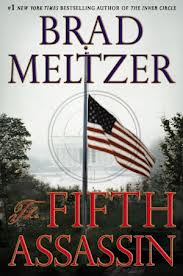 978-0446553971 – Grand Central Publishing – Hardcover – $27.99 (ebook versions available at lower prices, paperback edition due out in August 2013).
978-0446553971 – Grand Central Publishing – Hardcover – $27.99 (ebook versions available at lower prices, paperback edition due out in August 2013).
Brad Meltzer is an incredibly active writer, author of myriad best sellers in both fiction and nonfiction, creator of television shows, host of History Channel’s excellent show Decoded – which is fun, compelling and full of amazing historical detail. He’s also a comics fan and author of many critically-acclaimed comic books, including a nice run of Green Arrow stories, Identity Crisis and Justice League of America, for which he won the important Eisner Award. Sometimes one wonders if he ever sleeps.
Brad quite evidently has a voracious appetite for history, and especially for the kind of stories in history that fascinate so many of us. And as an unstoppable researcher, he gets into places that most of us simply never have the time or the chutzpah to find. What makes his fiction so compelling is that Meltzer is able to combine his passion for history with great storytelling and a clean, brisk writing style that propels his stories forward. And he does write characters we can relate to and enjoy as well, so there’s another reason to find and read his books.
The Fifth Assassin is a sequel to the earlier, and very successful The Inner Circle,a book I am sorry to say I have not read. That book introduced the Culper Ring, an informal organization founded by George Washington to defend the presidency of the United States. Each of these two books (and the next book, which will complete the trilogy these books have begun) can be read on its own. Being new to the story did not pose any problems for me in reading and enjoying The Fifth Assassin, though I am sure I would have enjoyed it more if I had read the first book first. Many of the characters in the new book were introduced in the first – and of course some of them are killed off in the second book, as there are other secret organizations out there, dedicated to much darker aims the Culper Ring must fight.
It does help that I am familiar with and enjoy the Decoded series (disclosure – I work with History Channel on book projects, one of which is a book based on Decoded that will be published by Workman in Fall 2013). The Fifth Assassin is linked to a number of historical mysteries covered in the Decoded’s two seasons on History. This novel has a pretty complicated plot, the details of which I will leave for readers to discover for themselves. There have been four presidential assassinations before now – Abraham Lincoln, James A. Garfield, William McKinley, and John F. Kennedy. What if there was a secret organization whose members were responsible for all of these murders? And what if there was a present day plot to add another president to the list of the dead? And what if the plot is being acted out by mysterious players whose aims are difficult to fathom and therefore difficult to stop?
Beecher White is Meltzer’s hero, and an unlikely one at that. I think he enjoyed creating a sympathetic hero who does not have any special powers other than his knowledge of history and ability to think – and act when needed, which of course any hero must do.
This is a wonderfully fun book which I enjoyed a great deal. Meltzer is incredibly skilled at plot creation and keeping his story moving organically, so we don’t feel manipulated or ever question the motivations or actions of his characters, i.e., we do not feel the hand of the plot maker at work, which is a terrific skill I greatly appreciate in a time when so many storytellers struggle to give their stories the kind of credibility and natural narrative movement that Meltzer seems to find so effortless to accomplish.
I’d recommend reading The Fifth Assassin, and then listening to this discussion about the book. I think it will add to the experience for readers. Brad Meltzer’s website is here and it’s worth a visit. If you get a chance to hear him read from or talk about his work in person, it’s worth the effort to see him. And Decoded, the television show, is in reruns on History’s H2 – if you have not seen them, take a look, there are some fun, thoughtful and compelling episodes. Brad Meltzer is a terrific writer, and great fun to to speak with, it’s a pleasure to have had the opportunity to talk to him about this book.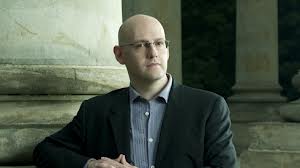
Podcast: Play in new window | Download
Publishing Talks: David Wilk interviews Glenn Nano
April 6, 2013 by David
Filed under Ebooks and Digital Publishing, PublishingTalks, Technology, The Future
 In this series of interviews, called Publishing Talks, I have been having conversations with both book industry professionals and others with interesting perspectives about the future of publishing, books, and culture. This is a period of disruption and change for all media businesses. We must wonder now, how will publishing evolve as our culture is affected by technology, climate change, population density, and the ebb and flow of civilization and economics?
In this series of interviews, called Publishing Talks, I have been having conversations with both book industry professionals and others with interesting perspectives about the future of publishing, books, and culture. This is a period of disruption and change for all media businesses. We must wonder now, how will publishing evolve as our culture is affected by technology, climate change, population density, and the ebb and flow of civilization and economics?
I hope these Publishing Talks conversations can help us understand the outlines of what is happening in, around and to the publishing industry, and how we might ourselves interact with and influence the future of publishing and culture as our interesting present unfolds into the future.
These interviews give people in and around the book business a chance to talk openly about ideas and concerns that are often only talked about “around the water cooler,” at industry conventions and events, and in emails between friends and they give people inside and outside the book industry a chance to hear first hand some of the most interesting and challenging thoughts, ideas and concepts being discussed by people in the book business.
Glenn Nano is a truly amazing guy I ran across first when he founded Code Meet Print, a “community at the intersection of texts + technology that will contemplate, define, and help build better interfaces for engagement, more relevant curators for discovery, and more useful marketplaces for dissemination of great writing and content to eager readers.” And at Tools of Change this year in New York, I had the pleasure of moderating a panel called “Beyond Devices: Is The Real Value of eBooks Social Engagement?” on which Glenn appeared, and impressed me with his incisive and original thinking.
Evidently, Glenn is a serial entrepreneur who brings great ideas into being, or spurs them forward. Aside from CodeMeetPrint, he also created Dictator Goods (you have to visit this site), was a principal at Centurion Venture Partners, and most recently engineered a very interesting start up called AnswerQi (“tech answers from real experts in real-time”, which I think is taking up most of his abundant energy for the moment.
As Glenn wrote in the introduction to Code Meet Print: “Words are finding new modalities, and innovators across disciplines have begun to experiment with how technology might improve their creation, curation, and consumption.” This sums up very nicely what so many people involved in writing, publishing and reading are trying to understand right now.
I am very pleased to have had the opportunity to talk with Glenn about his views of the current state of publishing, storytelling and writing, and his views about where we are headed. I think you will find this conversation to be among the most interesting on these now well-worn subjects that you will hear or read. Glenn thinks about the digital present in a way that I think alot of people whose roots are in traditional publishing simply do not natively understand. So there is always something for us to learn from what he has to say.
Alert to listeners, we were having alot of fun talking, so this interview runs longer than usual at 46 minutes. 
Podcast: Play in new window | Download
Publishing Talks: David Wilk interviews Andy Doe
March 6, 2013 by David
Filed under Ebooks and Digital Publishing, PublishingTalks, Technology, The Future
 In this series of interviews, called Publishing Talks, I have been talking to book industry professionals and other smart people about the future of publishing, books, and culture. This is a period of disruption and change for all media businesses. We must wonder now, how will publishing evolve as our culture is affected by technology, climate change, population density, and the ebb and flow of civilization and economics?
In this series of interviews, called Publishing Talks, I have been talking to book industry professionals and other smart people about the future of publishing, books, and culture. This is a period of disruption and change for all media businesses. We must wonder now, how will publishing evolve as our culture is affected by technology, climate change, population density, and the ebb and flow of civilization and economics?
I hope these Publishing Talks conversations can help us understand the outlines of what is happening in the publishing industry, and how we might ourselves interact with and influence the future of publishing as it unfolds.
These interviews give people in and around the book business a chance to talk openly about ideas and concerns that are often only talked about “around the water cooler,” at industry conventions and events, and in emails between friends and they give people inside and outside the book industry a chance to hear first hand some of the most interesting and challenging thoughts, ideas and concepts being discussed by people in the book business.
I discovered Andy Doe’s writing quite by accident, and a happy accident that was. UK based, Andy comes from the music business. Most recently, he was the COO at classical music label Naxos from 2010-2012, and was head of classical music at iTunes from 2004-2010; now he freelances to help artists, labels and other organizations on recording and marketing activity, both on and offline. He also blogs brilliantly and with a great sense of humor at Proper Discord.
A piece he posted in November, 2012 caught my attention and is one I highly recommend to anyone interested in physical and digital media; it’s called What is Going on with the Record Industry (at New Music Box, a very cool site about new music). It’s a list of ten observations with explications of each. The first one is called “Almost everything you read about the state of the record industry is, at best, totally useless,” which should give you a good idea of where Andy is coming from and where this piece might be headed.
Naturally, I thought it would be fun to talk to Andy about his thinking about the record business and to draw him out on how what has happened and is happening in that industry might apply (or not apply) to the book business. We do tend to think that all entertainment media businesses, including books, music, television, radio, film, video games and even newspapers have similar enough structures and relationships between physical and digital media, as well as similar disruptive innovations as to make the experiences in one useful to the those who work in other creative industries. So we talked about that a bit, as well as how some of what Andy has observed and learned in the music business may not be relevant to book publishing. Overall, because he is such a smart and witty guy, I think this conversation should be of particular interest. As has happened recently, when discussions have been going well, we have gone a bit longer than podcasts usually go. This one is 47 minutes.
Another good reference point I should mention – here’s a written interview with Andy Doe by Tom Manoff you might enjoy as well.
And oh, by the way, this is the 200th interview I have posted on Writerscast since its inception just a few years ago. I’d like to thank all the wonderful writers, technologists and thinkers who have been willing to give me some of their valuable time to pepper them with questions and engage them in my enthusiasms and interests. And I’d also like to thank the individuals who have helped make this project work, my daughter, Emma Wilk, for editing my often poor efforts at recording, website builder and podcast expert Rob Simon of Burst Marketing, and his web guru, Jeremy Brieske.
And in particular I owe thanks to all of you who have listened and responded to this humble effort to contribute to the cultural and intellectual good of all. 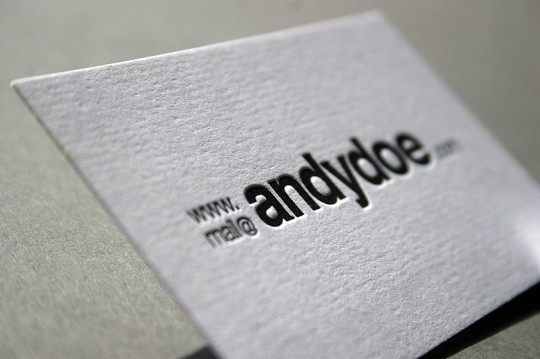
Podcast: Play in new window | Download
David George Haskell: The Forest Unseen
February 16, 2013 by David
Filed under Non-Fiction, WritersCast
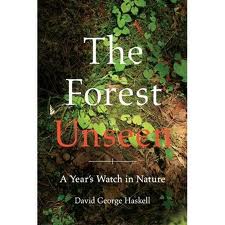 9780143122944 – Penguin – paperback – $16.00 (ebook versions available, hardcover also)
9780143122944 – Penguin – paperback – $16.00 (ebook versions available, hardcover also)
Most of us are not very good at seeing the details in the world that surrounds us. We’re in a hurry, we’re overloaded with information, and we don’t really have the patience for the kind of looking that it takes to absorb and think about that kind of information.
The brilliant geographer, Carl Ortwin Sauer observed this about naturalists:
“Much of what [they] identify and compare lies outside of quantitative analysis. Species are not recognized by measurements but by the judgment of those well experienced in their significant differences. An innate aptitude to register on differences and similarities is joined to a ready curiosity and reflection on the meaning of likeness and unlikeness. There is, I am confident, such a thing as the “morphologic eye,” a spontaneous and critical attention to form and pattern. Every good naturalist has it…”
This is a fairly apt description of the work that naturalist David George Haskell undertook before writing The Forest Unseen: A Year’s Watch in Nature. And what a beautiful book it is!
Haskell is a biologist at the University of the South in Sewanee, Tennessee. He located a small piece of old growth forest nearby (old growth forest typically still exists in relatively tiny pockets in places where the terrain was too difficult for loggers to get into). With a certain nod to Buddhism, Haskell found a one meter by one meter square piece of forest he termed his mandala, and committed to spending a full year in close observation of this tiny sampling of an original and relatively undisturbed ecosystem.
Over the course of that year, he intrepidly sat and watched, and sometimes closely examined with a magnifying glass, what happened in his square meter of land. Each time he visited what ultimately became his meditation place, he recorded what he saw, and then researched and wrote about what had happened during that day. Of course this sounds mundane and almost plodding. And in lesser hands, this would just be a perhaps valiant exercise in close observation,. But it’s in the writing and the meditative exploration that Haskell was able to transform his seen experience into magical prose explorations of nature and what it means to us.
Finding a tick on him leads to a discourse on the life cycle of the tick that is worth re-reading several times. Hearing a chickadee in winter leads him to write about the amazing ways that these little birds survive the winter. Finding a golf ball in his sacred space (this may be a piece of wilderness but it’s boundaries by a nearby golf course) provides Haskell with the opportunity to explore the meaning of what is the definition of “natural” and the relationship of humans to nature.
David Haskell writes beautifully about nature, but as well, writes brilliantly about the ideas that closely examining the natural world inspire in an intelligent and perceptive human being. You can read this beautiful book simply to learn a great deal about a wide range of creatures and plants that we often take for granted, how an ecosystem works across time and changing seasons, and how in fact any of us could learn more by close observation. You can also read this book simply for the sheer beauty of the writing, and the brilliance of its descriptive passages. Haskell has extended beyond scientific or nature writing with a poetic and spiritual grace and the power of contemplative thought to create something very special and uniquely his own.
This is a book I have been buying frequently to give to friends and family (I am related to two active biologists), and recommend to everyone as one of my favorites. It was a great pleasure to talk to David Haskell about his work. I’ve been enjoying reading his blog, called Ramble, now on a regular basis, it’s a wonderful journey for anyone interested in the natural world and how to see it clearly.
Haskell holds degrees from the University of Oxford (B.A. in Zoology) and from Cornell University (Ph.D. in Ecology and Evolutionary Biology). He is Professor of Biology at the University of the South, where he has served both as Chair of Biology and as an Environmental Fellow with the Associated Colleges of the South. He is a Fellow of the American Council of Learned Societies and was granted Elective Membership in the American Ornithologists’ Union in recognition of “significant contributions to ornithology.” He served on the board of the South Cumberland Regional Land Trust, where he initiated and led the campaign to purchase and protect a portion of Shakerag Hollow, where the The Forest Unseen is set, a forest that E. O. Wilson has called a “cathedral of nature.” David Haskell lives in Sewanee, Tennessee, where he and his wife, Sarah Vance, run a micro-farm (with goat milk soaps available for purchase at Cudzoo Farm’s pretty cool website).
Note to listeners – I read this book in its lovely Viking hardcover edition, this interview is being posted in February, 2012; as of the end of March 2012, the paperback edition will be available. The cover here is of the hardcover edition.
Podcast: Play in new window | Download
Publishing Talks: David Wilk interviews Ishmael Reed
January 31, 2013 by David
Filed under Ebooks and Digital Publishing, Publishing History, PublishingTalks, The Future
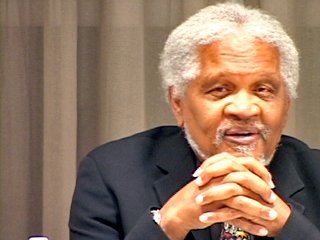 In this series of interviews, called Publishing Talks, I have been talking to book industry professionals and other smart people about the future of publishing, books, and culture. This is a period of disruption and change for all media businesses. We must wonder now, how will publishing evolve as our culture is affected by technology, climate change, population density, and the ebb and flow of civilization and economics?
In this series of interviews, called Publishing Talks, I have been talking to book industry professionals and other smart people about the future of publishing, books, and culture. This is a period of disruption and change for all media businesses. We must wonder now, how will publishing evolve as our culture is affected by technology, climate change, population density, and the ebb and flow of civilization and economics?
I hope these Publishing Talks conversations can help us understand the outlines of what is happening in the publishing industry, and how we might ourselves interact with and influence the future of publishing as it unfolds.
These interviews give people in and around the book business a chance to talk openly about ideas and concerns that are often only talked about “around the water cooler,” at industry conventions and events, and in emails between friends and they give people inside and outside the book industry a chance to hear first hand some of the most interesting and challenging thoughts, ideas and concepts being discussed by people in the book business.
Ishmael Reed is not only one of my favorite writers (fiction, poetry, theater and a wide range of nonfiction), he is an editor, publisher, literary activist and one of the founders of the Before Columbus Foundation, which has sponsored the American Book Awards since 1980. His latest publishing venture is Ishmael Reed Publishing Company, sponsoring the work of a diverse set of writers from many continents, including an online magazine, Konch. He blogs for the San Francisco Chronicle at www.sfgate.com.
His own books include the now classic Yellow Back Radio Brokedown, Mumbo Jumbo, The Freelance Pallbearers (a book I like to re-read at least once every five years), Flight to Canada as well as an amazing number of collections of essays, plays and poems, and recently, Powwow: Charting the Fault Lines in the American Experience, an anthology he co-edited with Carla Blank. Forthcoming books include The Fighter and the Writer: Two American Stories (Random House), and Brawls, a new collection of Ishmael’s always provocative and on point essays. Ishmael Reed is a massively prolific writer in a wide range of forms.
You can read a complete biography of Ishmael here. It’s pretty impressive, but listen to this interview I did with him to get a real sense of what he has done to support and promote the full breadth of writing and creativity in this country (and around the world). Ishmael Reed gives voice to the heart and soul of the river of creativity that flows out of and through the great American continent, and never fails to tell truth to power, expose alternative views of accepted wisdom, and makes us think long and hard about who we really are.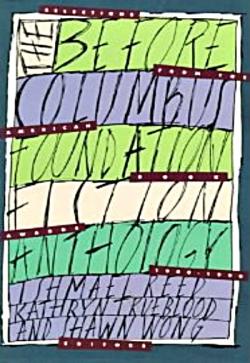 This conversation covers a wide range of topics, and includes much about the history of independent publishing in the last several decades, and much more.
This conversation covers a wide range of topics, and includes much about the history of independent publishing in the last several decades, and much more.
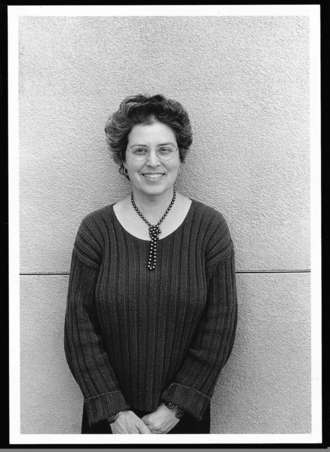 A guest appearance by editor, writer and professor Carla Blank near the end of our talk.
A guest appearance by editor, writer and professor Carla Blank near the end of our talk.
Carla Blank
Podcast: Play in new window | Download
Michael Feinstein: The Gershwins and Me: A Personal History in Twelve Songs
January 13, 2013 by David
Filed under Non-Fiction, WritersCast
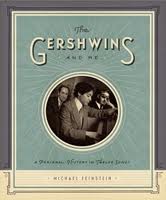 978-1451645309 – Simon & Schuster – Hardcover – $45 (ebook editions available at lower prices)
978-1451645309 – Simon & Schuster – Hardcover – $45 (ebook editions available at lower prices)
Michael Feinstein is doubtless the most active supporter and proponent of the Great American Songbook we have. Aside from his own inspiring performances, he is an incredible impresario of the music he loves and that he loves to share. His “Michael Feinstein’s American Songbook” show is on PBS (and past seasons are available on DVD). He performs more than 200 times a year, and records regularly.
Michael has been nominated for five Grammys, most recently in 2009 for The Sinatra Project and his TV special, Michael Feinstein – The Sinatra Legacy, is currently airing on PBS.
He is also the founder of the Feinstein Initiative, that preserves and promotes the Great American Songbook, and serves as Artistic Director of the Palladium Center for the Performing Arts, a $170 million, three-theatre venue in Carmel, Indiana, which opened in January 2011. The theater is home to an annual international Great American Arts festival, diverse live programming and a museum for his rare memorabilia and manuscripts. Starting in 2010, he became the director of the Jazz and Popular Song Series at New York’s Jazz at Lincoln Center. In 2013, he will replace the late Marvin Hamlisch as the lead conductor of the Pasadena Pops.
His many other credits include scoring the original music for the film Get Bruce and performing on the hits television series “Better With You,” “Caroline in the City,” “Melrose Place,” “Coach,” “Cybill“ and “7th Heaven.”
Feinstein was born in Columbus, Ohio, where he started playing piano by ear as a 5-year-old. After graduating from high school, he worked in local piano bars for two years, and then moved to Los Angeles when he was 20. The widow of legendary concert pianist-actor Oscar Levant introduced him to Ira Gershwin in July 1977. Feinstein became Gershwin’s assistant for six years, deeply influencing his life and setting him on the path that has become his life as a singer, songwriter and promoter of music.
In The Gershwins and Me, Feinstein tells a personal story in which each of the twelve chapters highlights one of the Gershwin classic songs, using them to tell the story of the Gershwin brothers and their family, illuminating their music and incredible creativity, and telling memorable personal stories throughout. In this unusual narrative, Feinstein tells a moving chronicle of his own life with the Gershwins and his vision of how their music inculcates so much of modern American life. It’s a wonderful, personal and special book that I very much enjoyed discussing with author Michael Feinstein, whose amazing website demonstrates the incredible breadth of his work in music.
Podcast: Play in new window | Download
Melanie Hoffert: Prairie Silence: A Memoir
January 2, 2013 by David
Filed under Non-Fiction, WritersCast
 978-0807044735 – Beacon Press – hardcover – $24.95
978-0807044735 – Beacon Press – hardcover – $24.95
(ebook editions available at lower prices)
Melanie Hoffert’s Prairie Silence is about growing up on the prairie of North Dakota. The silence she talks about is most often her own, though there are many other kinds of silences in the small town she grew up in. Her story is about growing up gay in a place that seems alien to her, in a family she felt she could reveal her true self to (until much later in her life after she had moved away – her eventual coming out story is just emblematic of the awkwardness that she mostly recognizes now was projected rather than felt).
Now living in Minneapolis, Hoffert feels the need to return home to her family farm, to work with her farmer father and brother, reconnect to her mother, and to better understand the place she came from. Interacting for a solid period of time with family, friends and neighbors gives the book its narrative, and places her in the complicated nexus of self, place and other.
Prairie Silence is a warm, sometimes surprising memoir that combines an internal voice with a clear eyed reflection of the northern plains we often call the “heartland,” whose residents often and perhaps ironically, have terrible challenges connecting with their own hearts and souls, and thus are unable to sympathize with the hearts of others, especially those who don’t share their own values. But as she learns more about the people she left behind, Hoffert does find connections, and real ones, with many of those to whom she could not trust to reveal herself.
Hoffert’s prose is plainspoken and clear, just as she was in her interview with me about this strong debut work of nonfiction. A warm and loving memoir I highly recommend and an excellent introduction to a fine new writer.
Melanie has an MFA in creative writing from Hamline University, and her work has appeared in several literary journals. She received the 2005 Creative Nonfiction Award from the Baltimore Review and the 2010 Creative Nonfiction Award from New Millennium Writings. Since 2008 she has worked for Teach For America as managing director of TFANet, the online social-networking hub for their corps members and alumni.
Author website here.
“Sometimes at dusk, when the world is purple, I go searching for elements of a small town in the city. I usually walk down alleys, where yellow light spills from the back of houses onto piles of dusty red bricks and onto old lumber; where forgotten white Christmas lights crawl like vines over many of the fences; where junk cars sit as if in a museum; and recycling bins display the ingredients of meals consumed weeks ago. In alleys people do not have a need to present a manicured life and I feel closer to the neighbors I will never know. In these alleys, where the roads are narrow and life is presented as it is lived—messy and whimsical—I see glimpses of what I left behind.”
Podcast: Play in new window | Download

